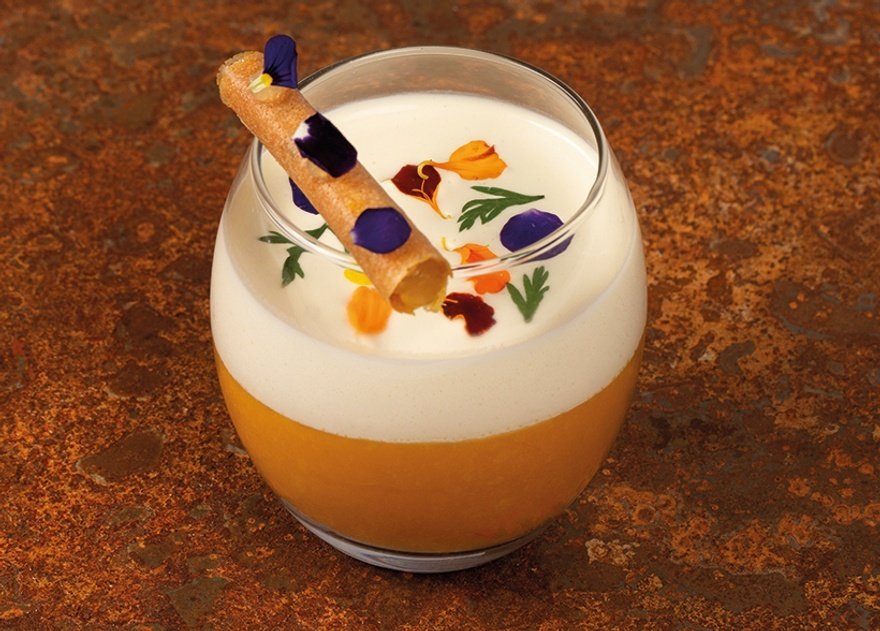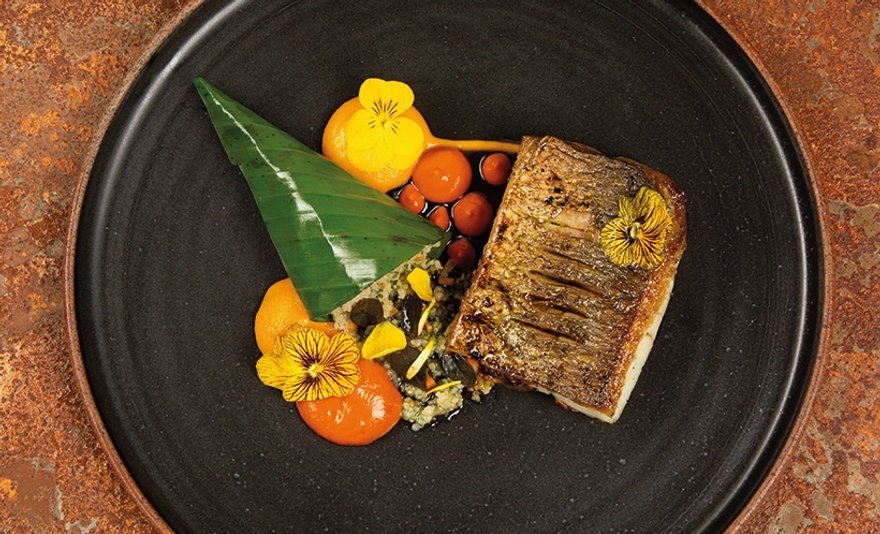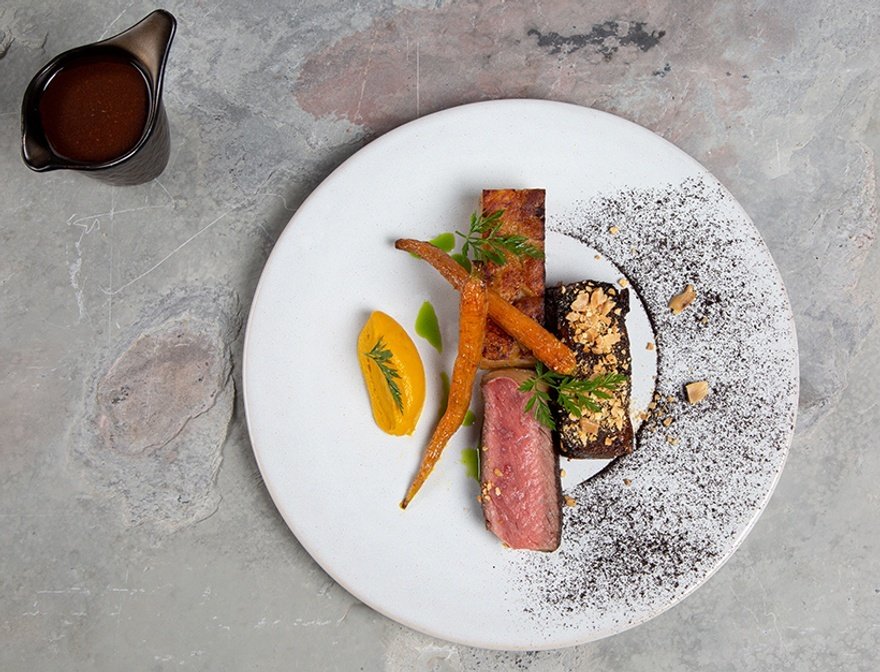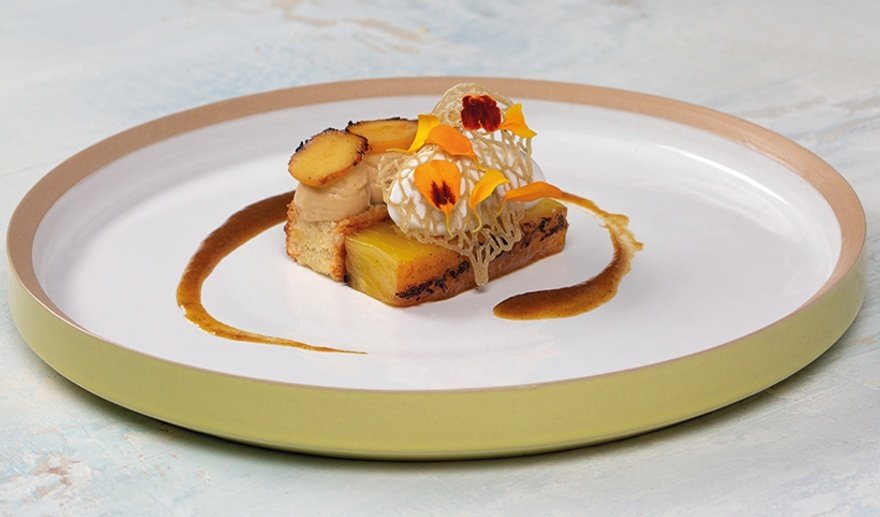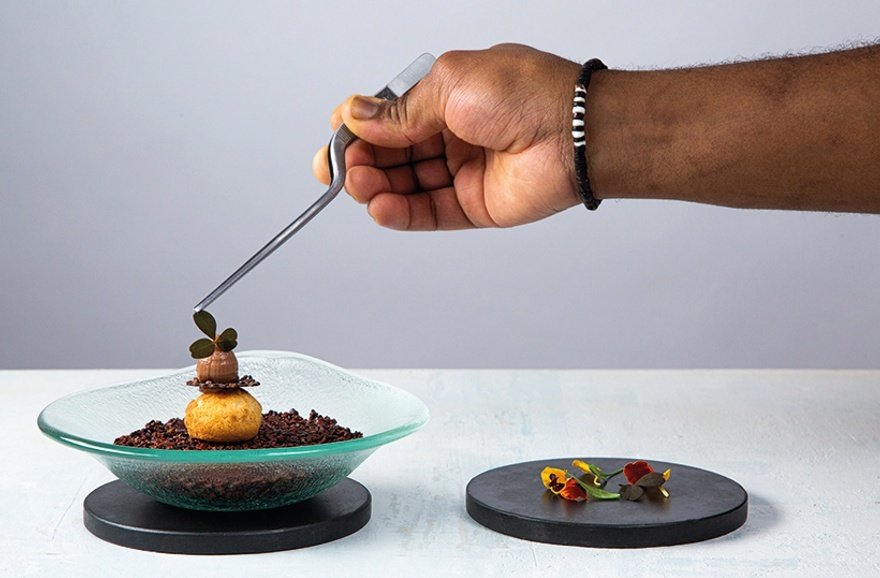The Future Plate supper club is creating a space for Black chefs to showcase African and Caribbean cuisine. Lopè Ariyo finds out more from its founder and hears about the classically trained chefs delivering the comfort and flavour of traditional dishes in a modern style.
Last year Julian George, the founder of visual art project Chef Signatures, released a photo series called ‘Made You Look', an impactful exhibition of images highlighting 31 Black chefs and their food. Launched during Black History Month, the largely black and white images included eye-catching bursts of colourful food, and aimed to put a spotlight on the talents and cultures of Black chefs. The exhibition, first shown at Boxpark in London's Shoreditch, went on to grace the windows of department store Flannels on Oxford Street, where it started to gain press attention.
The photo series soon evolved into the Future Plate project, which started with a soft launch by way of a residency at Carousel in Fitzrovia, London over the summer. "We exhibited the images in the gallery, alongside a dinner series where the chefs were able to showcase their talent, cuisine and story," says George.
A launch event was then held in October in the Bingham Riverhouse in Richmond, where African and Caribbean cuisine was presented in an extravagant and refined manner. Six chefs came together to create a five-course tasting menu for 80 guests over the course of two nights. Taking as its motto, ‘sharing culture through food', Future Plate aims to let African and Caribbean chefs tell stories about their history, culture and traditions.
"The whole concept was born out of the exhibition," explains George. "I felt there was a lack of light being shone on the chefs themselves. I sat down and thought we needed to put together events to allow the chefs to showcase their talents and allow them to cook the dishes they grew up on and share them with people."
The next event will see Future Plate partner with Westminster Kingsway College, London, where chefs will deliver a guest lecture about their cuisine to students, as well as offering a tasting menu at the Escoffier restaurant, with chef Jason Howard up first. There are plans to hold more events in restaurants all over the UK. Some will feature panel discussions, and all will have their own themed menu, through which the chefs can portray issues facing African and Caribbean communities in the UK through food.
Meanwhile, George is looking for a permanent site for Future Plate. The idea is, as with Carousel, for chefs to come in on a rotating basis to showcase their cuisine and gain exposure to further their careers. He says: "I felt there was no point in doing this as a one-off, as it needs to have a future and a foundation. What better way to do this than inspire the next generation to take this forward regardless of race?"
Despite a recent rise in the number of high-end dining establishments working with African and Caribbean produce – for example, Ikoyi, Akoko and Stork – George says the culture and the cuisine needs to be better established in the hospitality industry. "I'm very mindful that in a sense with cuisines like Indian, you have Asian chefs like Iqbal [Wahhab] of the Cinnamon Club spearheading that and pushing it, and then the industry follows. We want to spearhead African and Caribbean cuisine and put it on a par with the other cuisines in the UK." He adds that the Asian community has historically collaborated in pushing different elements of their food and culture.
"African and Caribbean cuisine has not had the opportunity as yet, but it's now starting to develop. In years to come it will be a cuisine that people will know inside and out to the same extent they know Chinese and Indian cuisine – hence the name behind it being the Future Plate. A lot of people are saying it's the next big cuisine to blow up."
With events, a future permanent space and partnerships with Westminster Kingsway College, George adds he would like to see "the next generation come and, hopefully, fly and take African and Caribbean cuisine to a level that we could only dream about".
The chefs
The chef line-up for the Future Plate launch event at Bingham Riverhouse comprised Michelle Trusselle, Mussa Fatti, William Chilila, Opeoluwa Odutayo, Jermaine Cunningham and Brian Mwangi. All six are Westminster Kingsway College alumni, and between them they have ties with Senegal, the Gambia, Nigeria, Kenya, Zambia, South Africa, Ghana and islands across the Caribbean.
Although they are all classically trained, the chefs are passionate about embracing their own cultures and elevating traditional African and Caribbean dishes with modern techniques. Trusselle says she presents her food with "all those Caribbean flavours delivered in an exciting and kind of new way", while Mwangi works on "bringing Kenyan flavours into modern gastronomy".
Different isn't always seen as good when it comes to African and Caribbean cuisine. The communities the cuisines are tied to often prefer dishes to be cooked traditionally, out of fear that they will otherwise lose their core flavour. Any variation is subject to rigorous scrutiny and may be dismissed as inauthentic.
The Future Plate chefs say this does not concern them. Trusselle explains: "I don't worry about that, because I research the dishes and taste them over and over again in their traditional format to really understand what makes the dishes really good. So with my food, yes, it's presented differently. But, when you're eating it, you're getting those same comforting and homely kind of flavours."
In addition to incorporating his heritage and the foods he grew up with into modern dishes, Fatti explains that his "main goal as an African chef in Europe is to take African food, be able to cook it and make it popular over here".
The chefs have brought their individual dishes to the Future Plate menu, and worked together to develop and finesse them. "There's a lot of work that's gone on behind the scenes where we've had multiple tastings and photo shoots to see how everything works, how everything connects," says Chilila.
Trusselle says: "We've made sure we haven't overlapped certain ingredients so that it's not the same or repetitive. But it really is an amazing feast because of all the different flavours".
"You're never going to know what's next, because there's different contemporary interpretations of styles and people's backgrounds," adds Cunningham. "You're experiencing something new, something vibrant, something fresh."
The Future Plate menu
At the inaugural event, the meal started with stout bread and pimento-spiced plantain butter. Across Africa and the Caribbean, plantain is a standard accompaniment, and Fati says playing with its versatility was a no-brainer. "I wanted to celebrate the similarities between the West Indies and West Africa."
A pumpkin velouté, curried crab and lemon verbena cylinder followed. Throughout the velouté are carefully diced morsels of roasted squash to add texture. "If you're going to do a soup, it needs to have different bits bulking it out and making it a lot more interesting," says Trusselle. To top it off, she adds a rich thyme foam for an additional burst of flavour.
The second starter – hand-dived scallops, Roscoff onion yassa, cassava velouté and caviar – was Fatti's work. For him, yassa is an entry point into Senegalese food. Traditionally the dish is made by fishermen, who marinate the day's catch for two to three days with onion, lime, black pepper and other seasonings on hand. When the fish is ready, it is grilled and "whatever was left over from the marinade – the onions and the garlic and all those beautiful flavours – you'd roast that and it would be your sauce", explains Fatti.
The main fish course of wild sea bass, attiéké, spinach stew and ata dindin was an ode to dishes made across West Africa. Attiéké is fermented cassava that undergoes a rigorous process of cleaning, drying and milling. "It ferments and builds up a sour taste, so it has very sharp notes," explains Chilila. The spinach stew, made with tomatoes, palm oil, red onions and fermented locust beans is used to cut into the sharpness of the attiéké.
Odutayo's meat course of aged Hereford sirloin, pepper soup-braised short ribs, plantain terrine and palm wine jus (see panel) followed.
Her dish is a twist on traditional Nigerian pepper soup, a spicy broth usually composed of several different types of meat. The core of a good pepper soup comes down to the way the spices are prepared, she explains. "Most of the time they roast them on open fire, like with firewood, and then dry them in the sun before blending."
For dessert, there was a meadowsweet cake with miso mousse, grilled pineapple and coconut sorbet and to finish it all off, the guests were served almond and pistachio financiers, mango and lime chocolates, coffee choux with yuzu and rum-bottle jellies, with Mwangi weaving parts of Kenyan culture through the coffee and rum in his petits fours.
"Everyone grew up drinking rum back in Kenya," he says. "A good way to finish a meal is a shot of rum."
Aged Hereford sirloin with pepper soup-braised ribs
For her meat course of aged Hereford sirloin with pepper soup-braised ribs, plantain terrine and palm wine jus, chef Odutayo coats the short ribs with a dry-rub spice mix consisting of uda seed, uziza, alligator pepper, ginger and more. She then slow-cooks them sous-vide overnight for 12 hours. The sirloin steak is kept simple and cooked medium rare.
To make the jus, the offcuts of the sirloin are added to the bones of the short ribs and boiled along with more of the pepper soup spice and some Scotch bonnets. The broth is then strained and put back on the stove with some red wine and palm wine to reduce.
On the side are some roasted carrots. A carrot purée is made by blending cooked carrots, butter and salt, plus carrot top oil to ensure there's as little waste as possible.
The plantain terrine is made as you would a traditional potato terrine. The plantains are sliced as thinly as possible using a mandoline. Doused in garlic, thyme and rosemary compound butter, they are then cooked in the oven for 160°C for an hour.
To finish plating the dish, Odutayo dusts it with plantain ash made by burning the plantain skin and grinding it to create a smooth powder.
Continue reading
You need to be a premium member to view this. Subscribe from just 99p per week.
Already subscribed? Log In


